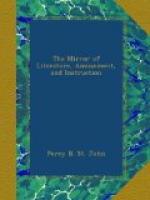felt in painting himself unamiably to the world
did not prevent him from being both startled and
pained when the world took him at his word; and, like
a child in a mask before a looking-glass, the dark
semblance which he had half in sport, put on, when
reflected back upon him from the mirror of public
opinion, shocked even himself.
“Thus surrounded by vexations, and thus deeply feeling them, it is not too much to say, that any other spirit but his own would have sunk under the struggle, and lost, perhaps, irrecoverably, that level of self-esteem which alone affords a stand against the shocks of fortune. But in him,—furnished as his mind was with reserves of strength, waiting to be called out,—the very intensity of the pressure brought relief by the proportionate reaction which it produced. Had his transgressions and frailties been visited with no more than their due portion of punishment, there can be little doubt that a very different result would have ensued. Not only would such an excitement have been insufficient to waken up the new energies still dormant in him, but that consciousness of his own errors, which was for ever livelily present in his mind, would, under such circumstances, have been left, undisturbed by any unjust provocation, to work its usual softening and, perhaps, humbling influences on his spirit. But,—luckily, as it proved, for the further triumphs of his genius,—no such moderation was exercised. The storm of invective raised around him, so utterly out of proportion with his offences, and the base calumnies that were everywhere heaped upon his name, left to his wounded pride no other resource than in the same summoning up of strength, the same instinct of resistance to injustice, which had first forced out the energies of his youthful genius, and was now destined to give him a still bolder and loftier range of its powers.
* * * * *
“But the greatest of his trials, as well as triumphs, was yet to come. The last stage of this painful, though glorious, course, in which fresh power was, at every step, wrung from out of his soul, was that at which we are now arrived, his marriage and its results,—without which, dear as was the price paid by him in peace and character, his career would have been incomplete, and the world still left in ignorance of the full compass of his genius. It is indeed worthy of remark, that it was not till his domestic circumstances began to darken around him that his fancy, which had long been idle, again arose upon the wing,—both the Siege of Corinth and Parisina having been produced but a short time before the separation. How conscious he was, too, that the turmoil which followed was the true element of his restless spirit may be collected from several passages of his letters, at that period, in one of which he even mentions that his health had become all the better for the conflict:—’It is odd,’ he says, ’but agitation or contest of any




